August 28, 2019
Archipelago, or, How I Became an Accidental Self-Publisher
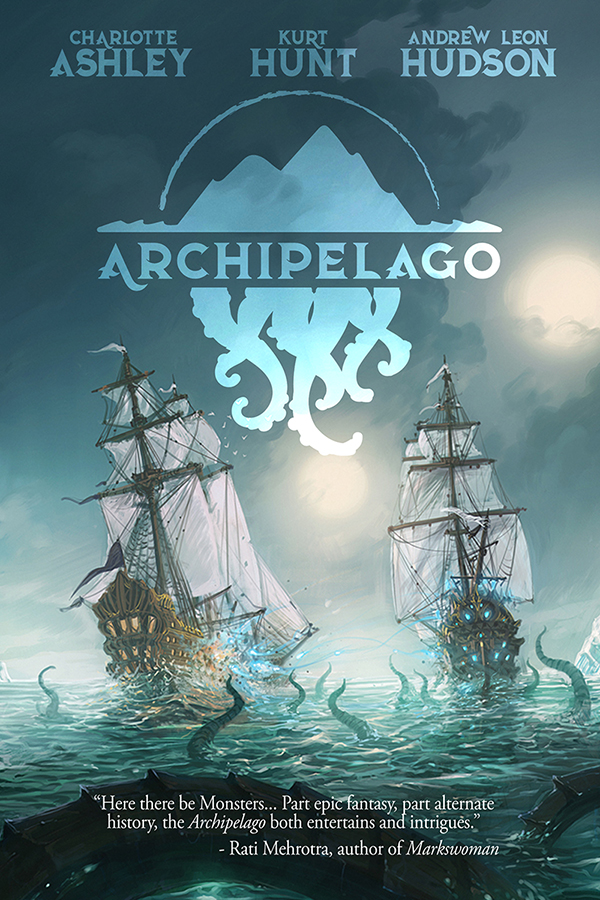
When we launched Archipelago as a Patreon-only project in 2017, we knew we were trying something traditionally nonviable. Patreon was (and is) an iffy lifeline for creators, but Kurt, Andrew and I had creative energy to spare and we wanted to try something new. So, we decided to write a serialized, collaborative, quasi-competitive trio of intertwined novellas. “On the side,” we told ourselves. Just to stretch those writing muscles a bit. (Yah, I know. I see the face you are making.)
The project was, by crowd-funding standards, a success. Not only did all kinds of people subscribe, but the “season” that we wrote was great. In fact, increasingly, my greatest frustration was that this throwaway experiment we had embarked on was better than it had any right to be. I spent a solid year sweating over what would ultimately become quite a long novella with multiple tie-in short stories, and it was paywalled on a difficult platform. I wanted it out.
But Patreon is still “published” and what do you do with three novellas that have already been published?
Archipelago is too good to abandon there. So we did what any self-respecting creative with too much energy does in 2019.5. We took up as indie publishers.
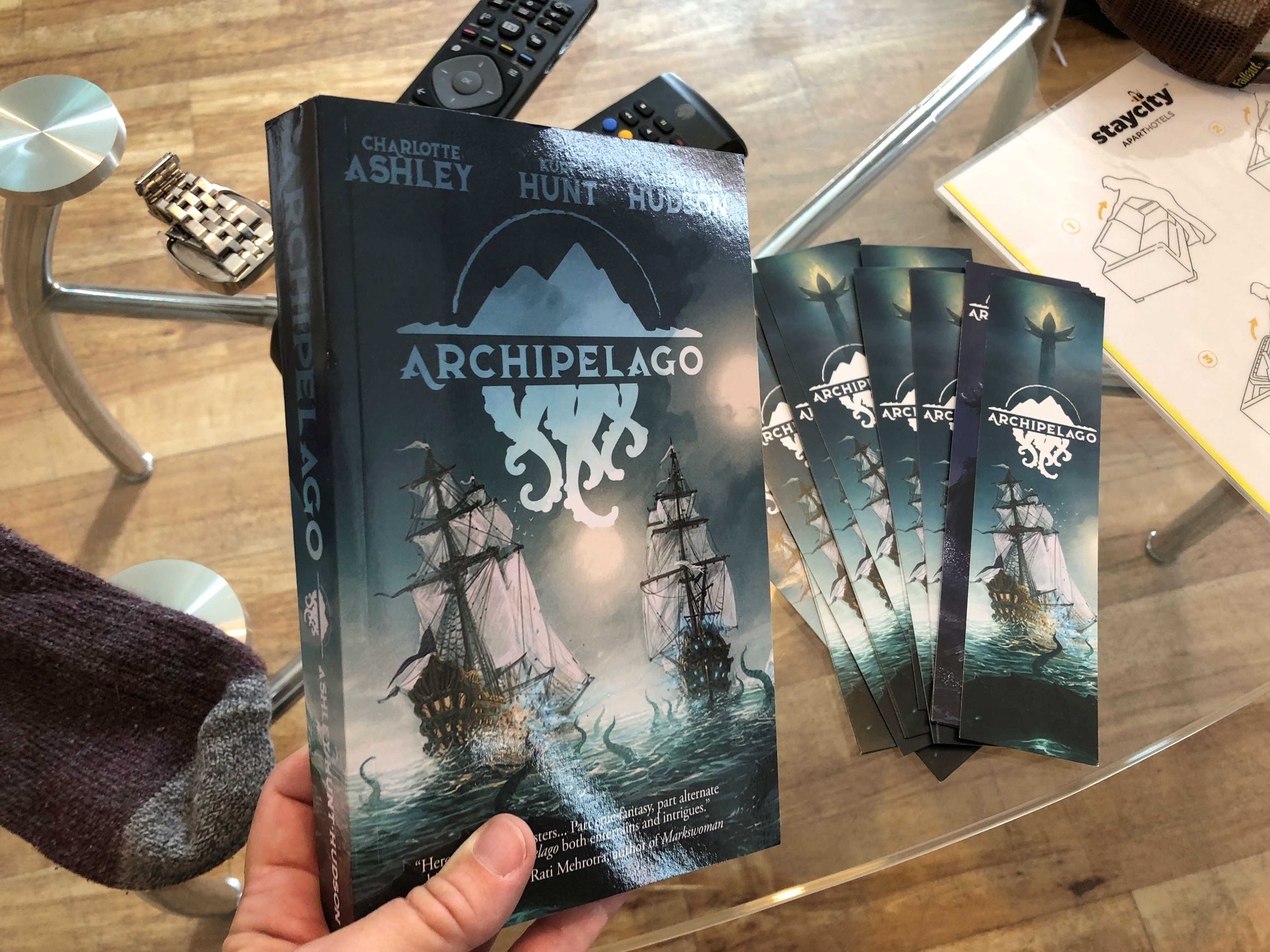
I have not been kind, in the past, about self-publishing.
Being deeply entrenched in the traditional publishing world set me up with a lot of hurdles to accepting self-publishing as a viable career option. I had seen, in the Olden Times, how vanity publishing [didn’t] work, and I could see many of the same pitfalls in new media self-publishing. It makes publishing easy, cheap, and quick, none of which are the hallmarks of quality. Millions of books are published every year, I knew, and reaching an audience is not simply a matter of putting text to screen/paper. Writers, publishers, distributors and booksellers together have to log thousands of hours of work to get a book not just published, but read. Who on earth wants to take that work on alone?!
Well, lots of people. Those of us in the trenches have wisely been calling the practice “indie publishing” for some time now, rather than “self-publishing.” Deciding to go into business as a small press publisher is a hecktonne of work for very little reward, but it is a Noble Cultural Endeavor with credentials ranging back to Gutenberg, so in both senses, that is really more what the current practice is like. Indie publishers are at the center of a huge industry that is keeping an awful lot of us creative types in food & rent: they understand the value of timeless arts such as copyediting, layout design, illustration, and marketing management. They know their craft and pay the bills. And, you know, their books are as good as anything out there.
Yah, I mean, there are still a lot of people out there who think you can bang off a draft, find a cousin who knows their way around Paint, and then upload it to KDP — and I FROWN AT YOU, folks — but this is 2019.5 and I have to finally admit that isn’t what indie publishing is. It hasn’t been for some time.
Well, guess what!
We didn’t want to self publish. Nothing great is created in a vacuum. We did what smart publishers do: we hired the best people we could find to do the best work. From the revisions to the layout to the logo design and cover art, we went over every stage of the publishing process with meticulous care and spared no expense getting the book we wanted in the end. This isn’t a vanity project. We are publishers, and we are professionals. Archipelago is something we wanted to be proud of.
And I am.
We launched the ebook in time for a Dublin WorldCon sale, but if you missed that, we’ve got something even better now. Today, the paperback goes on sale. With every paperback purchase you get the ebook free. Personally, I think the paperback is a thing of beauty but if you are into reading on your pad instead, then WHY NOT BOTH?
Naturally, I’d be thrilled if you bought the book. I would be even more thrilled if you wanted to review the book, on Amazon, Goodreads, your blog or elsewhere. And reach out if you want to talk! I’m eternally available for interviews and guest posts.
I never thought I would self publish. But then, I hadn’t imagined the Archipelago either. Now, I am grateful for both.
April 3, 2018
New Story @ Kaleidotrope!
We all have stories that are hard to sell. It’s not that they aren’t good, it’s that they don’t fit well into boxes. Is it science fiction? Fantasy? Historical? Urban? Will American audiences understand it, and is it appropriate for The Youths? You know what I’m talking about. The easiest stories to sell are the boring ones. The fun stuff? God help you.
‘Gog and Magog’ is one of the first short stories I ever wrote, back when I was a firecracker of pure, unrefined genius (or so I thought) and could write 2000 words a day in between research sessions. I had been reading The Alexiad, a chronicle written by Princess Anna Komnene around 1150, and was falling down rabbit hole after rabbit hole learning about the incredibly awesome women of the 12th century Byzantine world. Queen Tamar of Georgia! Melisende, Queen of Jerusalem! I mean, come on, Eleanor of Aquitaine!
I knew I wanted to make something of Queen Tamar’s badass daughter-in-law, unnamed by history. All we know about her was that she was a commoner and the priests hated her, but the king, George IV, was completely under her spell and married her anyway. This wasn’t a case of misogyny: after all, George succeeded his mother, and when he died prematurely at the age of 31, his sister, Rusudan took the throne. No, George’s wife was just a pain in the butt, someone who spat in the face of convention of authority. Whoever she was.
The first draft of ‘Gog and Magog’ was written almost entirely without punctuation, in the train-of-thought style of someone telling a story aloud. I wanted to capture that vernacular, archaic and oral, and have some fun with it. Well, you can guess how that went with editors. “There are spelling and grammar mistakes throughout….” I dialed it back a bit and started adding a caveat to my cover letters, but it was a tough sell. People don’t like unconventional styles, and the writer is not always there to say “Hey, guys, just relax and let it happen. Just read. It’s okay, I swear.” The readers will do what the reader will do.
But I wanted that voice. Maybe not the flatly incoherent one of the first draft – but reminiscent of a chronicle’s cadence and oral feel. Eventually, I trunked the story because I wasn’t willing to rewrite it conventionally. I might be a shill, but I have my pet projects. I loved that ridiculous first draft. I wasn’t giving it up entirely.
I shined it up for Kaleidotrope. If anyone would “get it,” it would be Fred Coppersmith. He has always taken chances on the weird stuff, and every issue is a well-curated set of matching weirds with spectacular art and presentation. An offer from Kaleidotrope is the kind of compliment that means something specific. I genuinely love being one of his authors.
So I am very pleased to say that my beloved ‘Gog and Magog’ is now up in the Spring 2018 issue of Kaleidotrope!
Drop me a line and let me know what you think! And as always, your support via coffee (e.g. booze) is always appreciated. 😀
March 19, 2018
ChiSeries this Wednesday!
Okay, Toronto! Hope you’re up for something fun this Wednesday, ‘cuz fun is what I’m up to!
This Wednesday, March 21st I will be reading at the monthly ChiSeries T.O. along with Rati Mehrotra, V.S. McGrath, and special-music-guest Kari Maaren! We’ll be at The Round in Kensington Market (152a Augusta Avenue) from 8pm-11pm. In addition to awesome readings and drinks, Bakka Phoenix Books will be there selling books – including much-sought-after PAPER COPIES of present and past issues of F&SF!
Do come out, and as always, don’t be a stranger. I’m always down to hang out with new people! 😀
March 1, 2018
Meet ‘The Satyr of Brandenburg’
It’s publication day!
My latest novelette, “The Satyr of Brandenburg,” is finally available for purchase! I sold this story back in April of 2017 after a harrowing revise & resubmit process (any writer will tell you that ALL revise and resubmit processes are harrowing; this was nothing worse.) I found out in September ’17 that my story would be the cover story, but it was not until last week that I finally saw the art!
This is my second story featuring the otherworldly duelist, La Héron, and I have by now a very clear idea of exactly what she looks like, how she smirks, how she stand when she’s ill at ease or laughing or drunk. Seeing her realized by an artist was a bit of a shock. She’s not what I imagined. But that’s the thing about story: it’s about what you imagine, not me. I am only here to guide the reader. This is someone’s La Héron.
Anyway, you can pick up the issue digitally or physically at:
Amazon
Amazon UK
Weightless Books
Direct from F&SF
In Toronto, you can get copies at Presse Internationale!
If you missed the first adventure of La Héron, catching up is easy – It is published & available as a podcast at PodCastle!
Like what you read here? Buy me a coffee!

November 21, 2017
A Short Note About Book Distribution
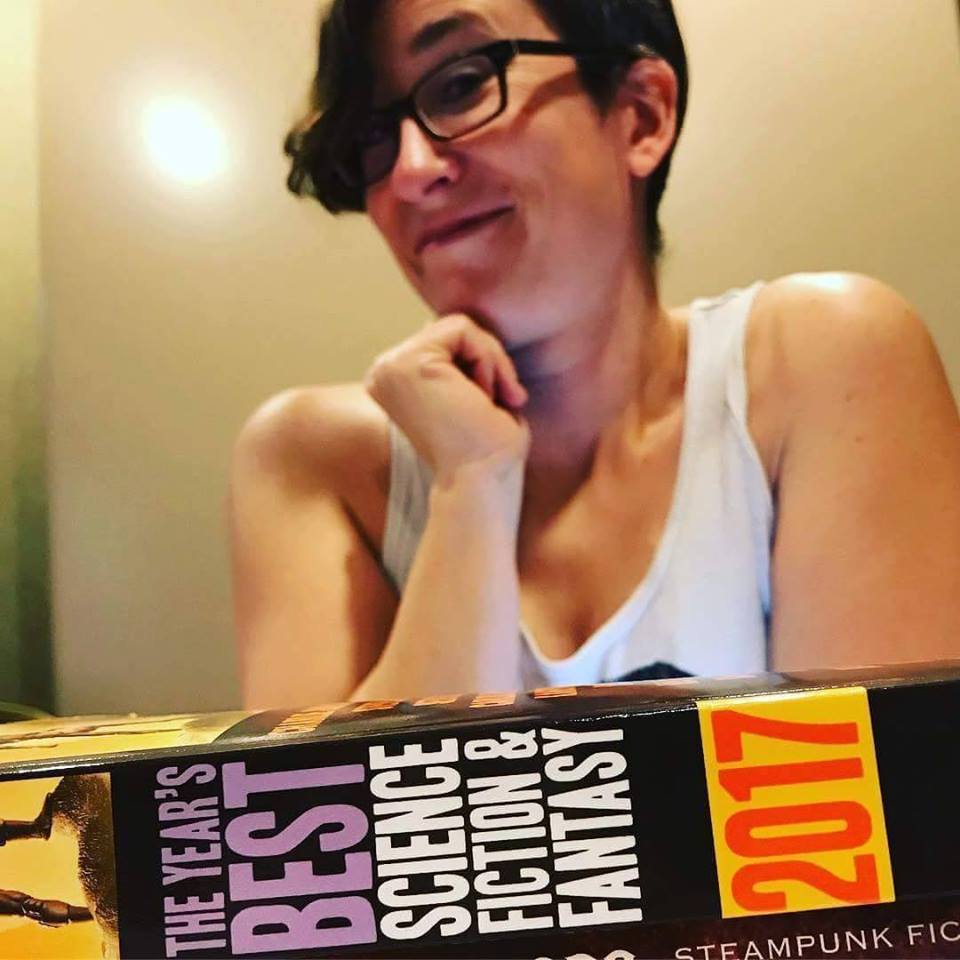 Good news first! The Year’s Best Science Fiction & Fantasy 2017 ed. Rich Horton (Prime Books 2017) is out, and I am in it! My contribution is “A Fine Balance,” originally published in the Nov/Dec 2016 issue of F&SF. I’m over the moon at being included!
Good news first! The Year’s Best Science Fiction & Fantasy 2017 ed. Rich Horton (Prime Books 2017) is out, and I am in it! My contribution is “A Fine Balance,” originally published in the Nov/Dec 2016 issue of F&SF. I’m over the moon at being included!
I… only wish it had been easier to actually get the book.
I work in a bookstore. I can, and do, order anything I like for myself, even under terms and conditions that we might not daily agree to. But this has been the second time this year that a book I appear in has been difficult, if not impossible, for me to bring in.
Last month, I spoke with a number of other writer/booksellers at a panel at Can*Con in Ottawa about how writers can interact with bookstores. Ultimately, it turned into an hour-long lesson on the supply chain, because writers don’t fully understand that getting published does not necessarily mean showing up in stores. Over the month since the con, I have come to realize even publishers do not understand how bookstores order and why they can’t get into stores.
So, I offer this to you: a quick breakdown, highlighting especially how the chain has changed in recent years to cut out smaller booksellers. I’ll borrow a thing or two mentioned by my fellow booksellers, Leah Bobet, Aura Beth Roy, and ‘Nathan Burgoine.
You write a manuscript.
![]()
A publisher (this might be you) turns it into a book.
![]()
The publisher places the book with a distributor.
![]()
The distributor sells the book to stores.
In addition, the distributor takes returns from bookstores, then can sell those books to other stores. The distributor also (often) will warehouse the book for a certain amount of time.
Bookstores like to deal with distributors, not publishers. This is because of the returns clause: most bookstores have the right to return usually 10-15% of their purchases to the distributor. The distributor gives the bookstore a credit when the books are received, and that credit can be spent on other books from that distributor. This means you might return a book from one publisher and spend the credit on a book from another publisher.
This is a credit worth having. It’s flexible. Dealing with each publisher individually would not only be a logistical nightmare, but it means your return credits would be of very limited use. What if that publisher only has one or two books? Nope. Consolidating through a distributor encourages bookstores to take risks on books and buy things from micropresses, because they aren’t trapped in a relationship with that one book.
From the publisher perspective, having a distributor allows them to mitigate the loss from returns, because those books stay in the distributor’s system longer, and can be re-sold to other stores. It allows them to get into bookstores all over the country/world, using that distributor’s infrastructure. It saves enormously on administrative nonsense. It opens the door into thousands of bookstores.
I understand publishers take a hit from this chain in two ways: one, the distributor takes a cut. They just do. That’s their price. Two, the distributor almost always allows returns from bookstores and thus, books will be returned, ultimately, to the publisher.
Nobody likes returns, but they are a fact of life in almost all retail. Every year, millions of new books are published. The bookstore buys them for roughly 40% off of cover price – meaning for every 2 new books we want to buy, we need to have sold 3 other books at full price. For every 2 books you see on the shelf, 3 other books had to be sold to pay for them. To say nothing of rent, labour, and operating costs. That’s a HUGE volume, and it never happens. If we had to wait to sell three book in order to buy two more, we would literally never buy new books. We’d just be sitting around waiting to move old, outdated stock.
Returns help. You send back last year’s fashions to make room for this year’s. Thus, the world goes around.
Some distributors have found a way to attract the business of nervous small publishers by offering that holy grail: NO RETURNS. Diamond Distribution, who specialize mainly in comic books, are the biggest of these. This is who distributes for Prime Books – the publishers of my Year’s Best.
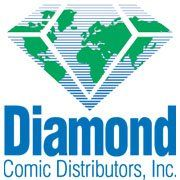 How do they do this? Well, they put the burden on the bookseller. In order to be allowed to order from Diamond, the bookseller needs to buy a minimum number of their books – which, again, are mostly comics and small presses. This minimum order gives you the right to a very limited discount (less than 40%) and no returns. If you want to be able to return books, your minimum order needs to be even higher. Returns only apply to new books – not backlist – and they need to be sent back quickly. They don’t have any shelf life.
How do they do this? Well, they put the burden on the bookseller. In order to be allowed to order from Diamond, the bookseller needs to buy a minimum number of their books – which, again, are mostly comics and small presses. This minimum order gives you the right to a very limited discount (less than 40%) and no returns. If you want to be able to return books, your minimum order needs to be even higher. Returns only apply to new books – not backlist – and they need to be sent back quickly. They don’t have any shelf life.
This is a model built for comic distribution, where new issues come and go monthly. For books – and graphic novels – it is totally non-functional. For this reason, most big comic book publishers have left Diamond and gone to more conventional distributors.
These days, I only find myself face to face with Diamond if I am dealing with a small press. These guys are usually just inexperienced. They were burned once by a high return, and they are determined it will never happen again, so they go with the big name that won’t give their books back.
But their books will never reach bookstores. Very, very few independents can afford to open an account with Diamond, much less a big enough account to get the terms they need. Diamond is a graveyard for small presses.
This brings us to Ingram. Ingram is the Amazon of distributors: a huge, sprawling mess of every book ever, with no customer service and very rigid terms. Almost everyone lists with Ingram because they might as well. Ingram will allow you to list your books as non-returnable, if you need to. They means, of course, they won’t warehouse them, and they may not offer the bookstores a discount. The bookstore can technically get the book, but they aren’t encouraged to. Aside from lack of returns and bad discounts, Ingram doesn’t offer any useful cataloguing service, they have no customer service, and their shipping fees suck.
I did, after all, order my Year’s Bests from Ingram. They were printed on demand and are, thus, miscut. There was no discount, and they were shipped to Canada at a great cost to us. Even at my “wholesale” cost, they cost me 50% more than cover price.
I was going to put them on the shelf and sell them, but I can’t. Not looking like that. Not at those rates.
So, what does a writer or publisher do, if they want their books easily available in bookstores?
Writers, ask prospective publishers who they distribute their books through. If the answer is “direct,” run. You might as well print your own book.
If they only distribute through Diamond or Ingram, know that this means your books will not show up in indies. They may not even show up at your local B&N or Chapters.
There are lots of good, reputable distributors in both Canada and the US. There are the big guys, of course: the distribution arms of Simon & Schuster, Penguin Random House, Hachette Book Group. I give Perseus distribution a tentative thumbs up, though they have recently been bought up by Ingram and have become very difficult to deal with, even though they operate separately from Ingram.
There are also excellent small press distributors who understand very well the challenges small presses face. Independent Press Group (IPG) and National Book Network do great work. In Canada, we have Literary Press Group (LPG), LitDistCo, Raincoast Books, Brunswick Books, and UTP Book Distribution. There are more, many distributing in particular types of books (university presses, scholarly publishing, children’s books, etc.) Do some research. Ask your local bookseller what they think of your choices.
Publishers, one last thing about returns.
Returns suck. I get it. Especially if the book store chain you are working with doesn’t even give the books back – some will just pulp the books and then bill you for them. But there are ways you can work this into your contracts or publishing model.
DON’T REPRINT RIGHT AWAY. Initial sales are ALWAYS inflated. Wait until the three month mark, when returns start coming back. Obviously, use your professional judgement: if your book was Tweeted out by Obama or up for a major award, REPRINT FOR SURE. But if Indigo just happens to be using it as a doorstop in all its stores, maybe wait. Give it a minute.
ASK FOR YOUR BOOKS BACK. Pulping is not in any way the industry standard. Your distributor can ensure that your books come back to you in salable condition. Take these on book tours with you.
OFFER FLEXIBLE DISCOUNTS. This is especially applicable if your distributor works with a discounter for overstock books. Got lots leftover? High returns? Offer them out for a bigger discount. Sell ’em to a discounter in bulk. The book chain is many-faceted, and your business plan has to account for the different stages of a book’s life. You might lose money at some of these discounts, but that is made up for with the better sales you get on front list by being out there with books easily available.
*
Now, it’s possible that this is indicative of a seismic shift in the industry. Diamond and Ingram are perfectly sufficient for dealing with Amazon. If most of your sales are through Amazon, then maybe it’s worth cutting out booksellers in order to get risk-free distribution.
I think this is narrow thinking. Booksellers are your army. They are your boots on the ground. Even if readers increasingly buy their books online, they still visit bookstores to browse, to talk to the staff. They want to see what’s out there, connect with people who love what they do. A bookseller is worth a ZILLION Amazon algorithms. Worth at least ten book bloggers, in my humble opinion, because we are steeped in this stuff. You want us to champion your books. You want us to put it in the hands of your readers.
Open floor, here. Any questions? I’m happy to field any technical book chain or publishing questions here. Pick my brain. That’s what booksellers are for. If you appreciate this post (and others like it,) click below to tip!
November 6, 2017
SFContario 2017!
In a couple of weeks, I will be hobnobbing at my local convention, SFContario 8. I’m not going to glad-hand this one – SFContario is pretty awful about letting people know what is going on ahead of time. There is virtually no information on their website about what you might find upon attending the con, but if you’re considering it, you can piece together some ideas from the posts made by other guests and panelists. A quick round-up (and if you have posted your schedule somewhere, let me know! I’m happy to link it.)
I will be there too! Here’s my schedule:
Eating and Ethics
Saturday, November 18th, 11 am w/ Alyx Dellamonica, Lawrence Schoen, and Gunnar Wentz
What is the ethical scope of our food choices? Is buying local really better than buying imported food? Are Vegans better for the environment? How do things like socioeconomic status, mental health, and disability intersect with the ethics of food consumption?
I’ll be moderating this panel and BOY is this in my wheelhouse. I have a degree in this! This exact thing!
Reading
Saturday, November 18th, 2-2:30 pm
I’ll be reading (probably) “The Ur-Ring” from my Archipelago world. This story is a good time, funny and crazy in good measure. Hope you’ll come listen!
How to Overthink Your Way Out of Writing
Saturday, November 18th, 3 pm w/ Charlotte Ashley, Matt Mayr, Ira Nayman, and Kelly Robson (moderator)
Theodore Sturgeon famously taught “Ask the next question.” Beginning writers everywhere are advised to ask “What if…?” as they develop their story. With a little research and some extra caffeine you too can come up with such a plethora of possibilities that your story becomes a dense jungle with no clear path–impenetrable and neverending. As denizens of the Digital Age, with its abundance of information and surfeit of attention span, we have never been in a better position to over-complicate our stories–and our lives!
How not to write an encyclopedia when you’re trying to tell a story. This should be vital.
Food in Fiction
Saturday, November 18th, 4 pm w/ Erik Buchanan, Eric Choi, Cathy Hird, and Gunnar Wentz
Stories that make you go, “Nom!” How do you describe food to express mood or set the scene? Join our panelists as they dish on the culinary delights that tantalize us in fiction, from regional teas to kingly feasts. What works? What doesn’t? And what should you know about a food-centric scene.
I’m moderating this one too – and yes, it will be very different from Food & Ethics! Expect this one to be much tastier and less sociological. 😉
See you guys there!
May 5, 2017
A Sequel, and Your Chance to Hear It!
I am absolutely thrilled to be able to tell you all that I have sold my sequel to “La Héron” – “The Satyr of Brandenburg” – to F&SF! This will be my 4th F&SF story, but my first sequel, and I’m really excited about it.
Short story writers, we have to get used to killing our darlings. A short story is a brief, stand alone medium. Nobody gets three-story short deals, and selling to the same place more than once is not always easy. You have to make a new case for how awesome your story is every single time you submit. It’s easier to write one and done – close all the loose threads and move on to new characters, new settings, new plots. Because you never know what will happen to it.
But I love La Héron and Alex. I loved them right away, and I knew from the get-go that they had more life in them than one fairy duel. I really, I realized, should have given them a novel right away, but I love the episodic format, meeting up with the same characters every week, or month, or year, for a new adventure. It was a hard sell, but a sell I knew I needed to gun for, because I couldn’t just leave these guys alone. They have adventures to undertake, foes to defeat, and intrigues to uncover.
I have no idea when “The Satyr of Brandenburg” will hit the shelves, but I will be reading from it this weekend at Ad Astra! This is your chance to get a little preview. I’ll be reading in the Markham B suite tomorrow morning at 10:30am – come for my co-readers, Tonya Liburd & Malon Edwards, and stay for a little taste of the further adventures of La Héron. It will be worth it all around!
April 24, 2017
Spring Cleaning!
I love change. You know that thing where you get frustrated with your life, so you cut all your hair off and dye it blue? That’s me, only with everything. Starting a new novel, painting a room, quitting a job or adopting a cat: it doesn’t matter how big or small a change is. The prospect of something new and different is my personal catnip, irresistible.
My desire to shake things up has often been at odds with my sense of responsibility, and one of the greatest lessons I have had to learn as an adult is the value of stability. Before I had kids, I often pictured myself as the sort of mother who would raise her children in a camper-trailer, traveling from place to place and training my children to be circus-performing ninja pickpockets. I cultivated an array of diverse skills from juggling and fiddling to sourdough baking and knitting, thinking I would live by my wits one day at a time, doing something different every day to suit the needs of the moment. I hated the idea of stagnation, of repetition.
I have had to learn differently. Change is exciting, but it is precarious. The greater, more lasting victories in life require harder work, slogging, dreaded repetition. You can’t give up on a thing when it becomes hard or boring. Building a legacy, even if it is just a family, requires roots. I learned to sit still and work.
This isn’t always good either. Sometimes, especially if staying put doesn’t come naturally to you, you can fail to see the point at which it is normal, and not compulsive, to give up on a thing. Change isn’t always just for thrillseekers. Sometimes it is the necessary next step.
This winter, I broke with my partner of 14 years, the father of my children. Subsequently, I realized I was not going to be able to make ends meet, going forward, by staying in the same bookstore I have worked in for 15 years. Big changes are coming.
The Short Game
I have been writing short stories for four years now. This spring, I sold the last of my unsold short stories – yep, I emptied the trunk. I am beyond thrilled with my success as a short story writer, but in light of my new work and financial situation, I know I will have less time and energy to dedicate to it, I might have to buy papers online to keep myself in the loops of inspiration.
No, I am not giving up writing. Au contraire, I have my sights on bigger projects than ever. Next month, I will be launching Archipelago, a shared-world, interactive serial swashbuckling novel. May 1st, we will launch both a Kickstarter campaign and a Patreon page through which you will be able to sample and support this endeavor.
It is so good, you guys. I say this is an utterly non-self-promotional voice… we’ve written something fantastic here, and I am so excited to share it with you. Watch this space for more.
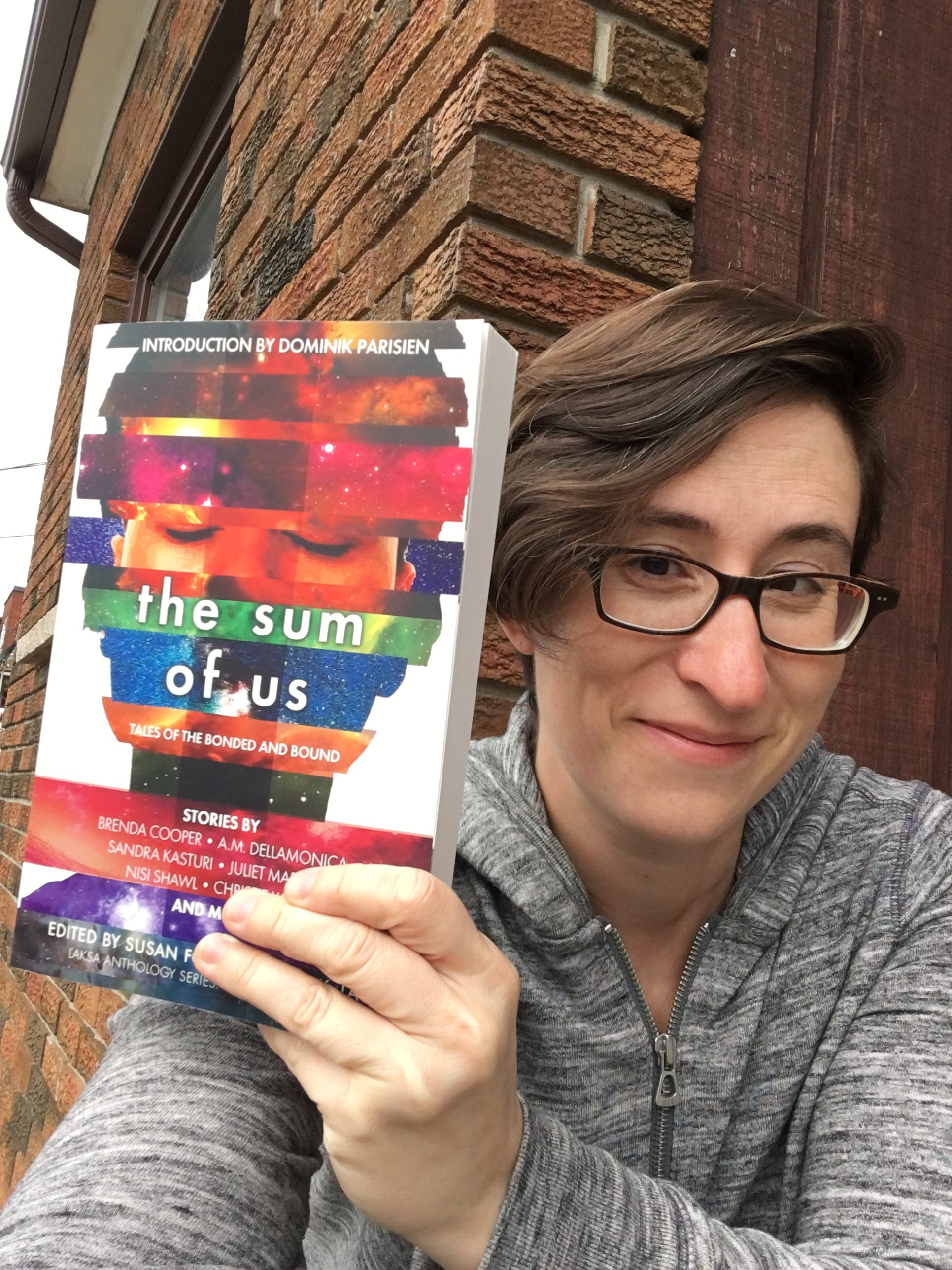 My short work will continue to appear over the next year or so. Last month, I spoiled the TOC of Sum of Us from Laksa Media, including my story, “Orang Tua Adventure Home Academy.” I now have this book in my hot little hands and it looks GREAT. That should be coming in September.
My short work will continue to appear over the next year or so. Last month, I spoiled the TOC of Sum of Us from Laksa Media, including my story, “Orang Tua Adventure Home Academy.” I now have this book in my hot little hands and it looks GREAT. That should be coming in September.
In June, “A Fine Balance” will turn up once again in The Year’s Best Science Fiction and Fantasy 2017 ed. Rich Horton. Watch for a selfie of that one too, possibly of me drooling on it, because YEAR’S BEST, GUYS!
I am pleased to tell you about two new sales as well!
My breakup revenge fantasy ecopunk scifi story, “She Falls,” will appear in Upper Rubber Boot’s forthcoming anthology Broad Knowledge: 35 Women Up To No Good. URB will be facilitating pre-orders via a Kickstarter in May, so release details will come then.
Then, one of my personal favourite stories, “Gog and Magog,” will appear in Kaleidotrope in 2018. “Gog and Magog” takes place in 12th century Georgia under the reign of Queen Tamar, told from the POV of an illiterate prostitute in the style of a medieval (Byzantine?) chronicle. And it is hilarious.
I will also suggest that there might be a sequel to “La Heron” on the horizon. *mysterious whistling*
But then what?
With Archipelago consuming most of my writing time and resume-writing taking up the rest, I am going to leave off short fiction for a while.
But then what?
Well, I don’t know. I have the world ahead of me. I am looking for a new job (writers, publishing people, leads appreciated) and wondering if I can – or should – keep my house. I’m meeting new people and trying new things. I’m thinking about school again. I’m letting myself get excited about potential.
It’s spring, and change is here. It’s hard not to love it.
March 14, 2017
Sum of Us TOC Announcement!
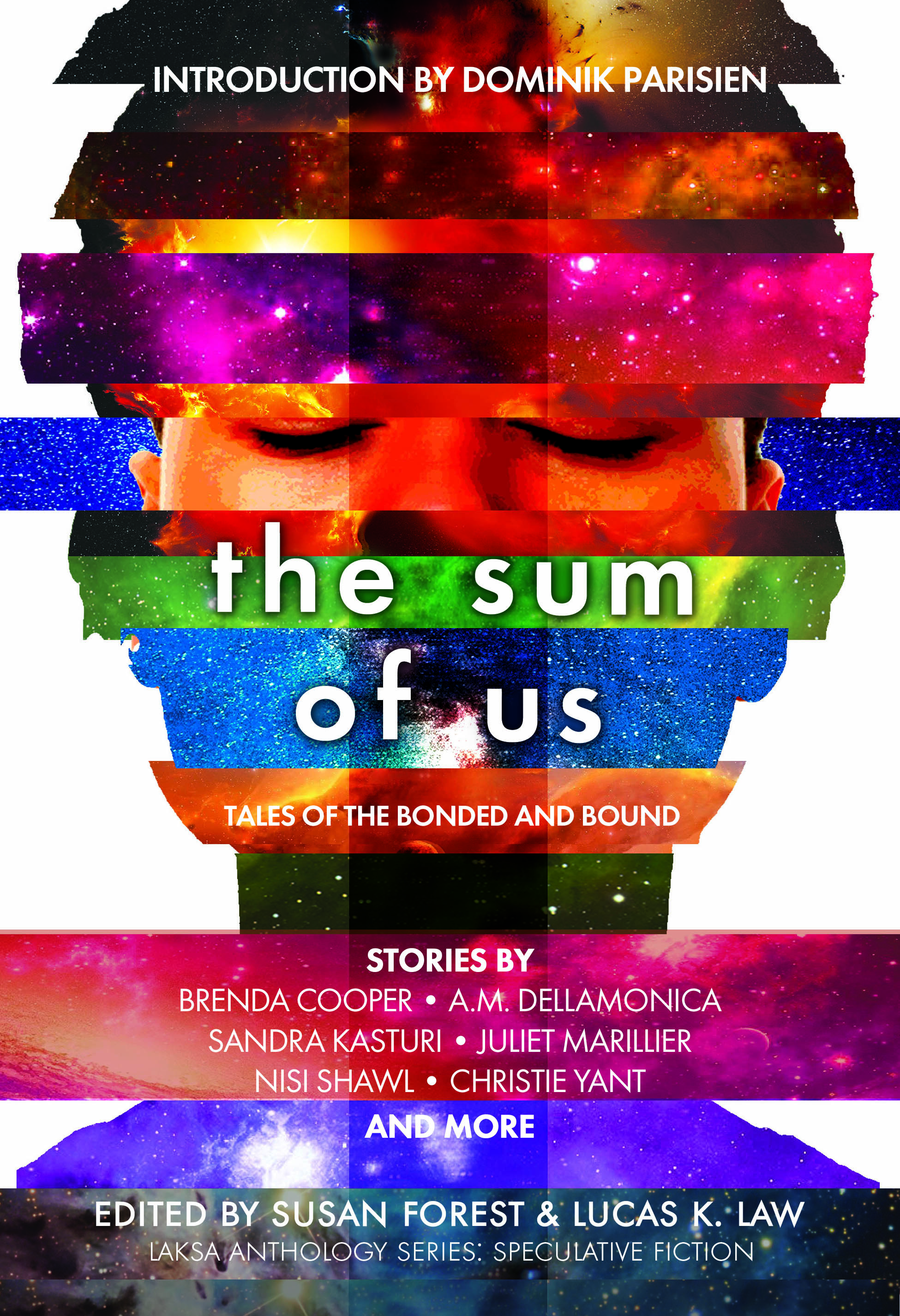 I have been waiting months to tell you about this one, you guys. Yes, I have another short story coming out in, yes, another nifty anthology. But lest you should think these are becoming routine, let me correct you. There’s is nothing routine about a project like this. I have been fired up about it since Lucas Law asked me to contribute.
I have been waiting months to tell you about this one, you guys. Yes, I have another short story coming out in, yes, another nifty anthology. But lest you should think these are becoming routine, let me correct you. There’s is nothing routine about a project like this. I have been fired up about it since Lucas Law asked me to contribute.
Sum of Us is an anthology of stories about the complexities of caregiving, explored through the lens of speculative fiction. That sounds specific, I realize, but it is something that is more fundamental than that: care, connections, community, responsibility for the sum of a people, rather than just the self…. these are things that inform all stories – or should – and I was really invested in exploring it.
I came up with my story immediately, inspired by my father’s attitude towards his own end of life (when it should come, which is hopefully not for ages and ages.) The elders in my life have been curmudgeons and grumps to a man, the sort of people who don’t want to be cared for and who stubbornly intend to raise hell until the moment they (presumably) spontaneously combust, leaving nothing to bury. These are people who, in my opinion, have a lot of energy to harness for grand adventures.
“Orang Tua Adventure Home Academy” is the story of one such curmudgeon who turns up on a beach in Penang, intending to vanish into the jungle, and winds up being pressed into some 17th century hydrodynamic engineering. This story wrote itself. I had so munch fun, and love my characters to pieces.
When I got the final TOC this week, my heart nearly exploded. I am in fantastic company. I genuinely can’t wait to see how this batch of geniuses engage our empathy. Check it out:
Foreword, Lucas K. Law
Introduction, Dominik Parisien
The Dunschemin Retirement Home for Repentant Supervillains, Ian Creasey
Bottleneck, A.M. Dellamonica
Mother Azalea’s Sad Home for Forgotten Adults, James Van Pelt
Things that Creep and Bind, Christie Yant
The Gift, Bev Geddes
The Gatekeeper, Juliet Marillier
The Healer’s Touch, Colleen Anderson
The Crystal Harvester, Brenda Cooper
The Burdens We Bear, Hayden Trenholm
A Mother’s Milk, Heather Osborne
The Mother’s Keepers, Edward Willett
The Oracle and the Warlord, Karina Sumner-Smith
The Beautiful Gears of Dying, Sandra Kasturi
The Gardener, Amanda Sun
Number One Draft Pick, Claire Humphrey
Orang Tua Adventure Home Academy, Charlotte Ashley
Sunshine of Your Love,- Nisi Shawl
Good-bye is that Time between Now and Forever, Matt Moore
Ambassador to the Meek, Alex Shvartsman
Gone Flying, Liz Westbrook-Trenholm
Am I Not a Proud Outlier?, Kate Story
Blinders, Tyler Keevil
Dreams as Fragile as Glass, Caroline M. Yoachim
Afterword, Susan Forest
Anyway, Sum of Us is due out on September 8th, 2017. You can pre-order the book directly from the publisher, Laksa Media. The official launch will be at When Worlds Collide in Calgary, AB in August. I won’t be there (unless someone wants to fly me out there, ha ha ha) but I’ll be at various Ontario launch parties. Watch for it!
March 13, 2017
Event Horizon 2017 – A Free Campbellian Anthology
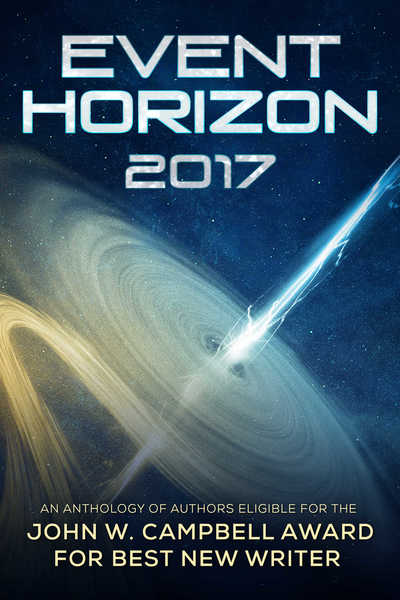 I blogged earlier this month about the Campbell Award, offering a suggestion or two for who you might want to nominate for it (including me). My list was short n’ sweet, being mostly stellar and very high-profile writers who have shot out into the field like a bundle of fireworks, but it was far from comprehensive. There are dozens of writers who have done some absolutely heartbreaking work in the last two years. Choosing a ballot of 5 is tough work.
I blogged earlier this month about the Campbell Award, offering a suggestion or two for who you might want to nominate for it (including me). My list was short n’ sweet, being mostly stellar and very high-profile writers who have shot out into the field like a bundle of fireworks, but it was far from comprehensive. There are dozens of writers who have done some absolutely heartbreaking work in the last two years. Choosing a ballot of 5 is tough work.
But Jake Kerr and Shirtsleeve Press managed to pull of a miracle. Over the course of about a week, they have pulled together Event Horizon 2017: An Anthology of Authors Eligible for the John W. Campbell Award. This free anthology includes the work of over 75 authors eligible for the Campbell award – some 400,000 words of fiction, some of which is being offered for free for the first time.
This includes my short story “A Fine Balance,” which can otherwise only be read on the paper pages of the Nov/Dec 2016 F&SF and the forthcoming Year’s Best Science Fiction & Fantasy 2017.
Event Horizon will only be available for a limited time. This link will disappear on July 15, 2017. But that is plenty of time to give it a skim and pick your Campbell nominees! You can nominate for the Campbell Award (and the other Hugo Awards) up until March 17th, 2017.
You have nothing to lose! Download the book for a tonne of great reading and an introduction to your next favourite authors. Enjoy!



